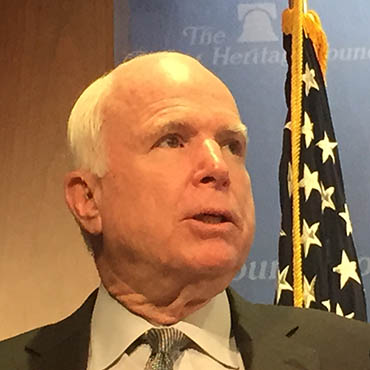Political battle escalates over charges of Russia election hacks
More members of Congress are joining the call for investigations of Russia's election hacking while the president-elect condemns the CIA and its findings.

Sen. John McCain is among the most senior Senate Republicans to call for a probe into allegations of Russian interference in the U.S. elections.
The political war over allegations of Russia's hacking of the 2016 U.S. election continues to heat up as more congressional leaders call for investigations and the president-elect says it's all bunk.
In a joint statement over the weekend, Sens. John McCain (R-Ariz.), Lindsey Graham (R-S.C.), Chuck Schumer (D-N.Y.) and Jack Reed (D-R.I.) said the stakes for America are too high for this to be a partisan issue, and called for a congressional investigation of Russia's election-related hacking.
"We are committed to working in this bipartisan manner, and we will seek to unify our colleagues around the goal of investigating and stopping the grave threats that cyberattacks conducted by foreign governments pose to our national security," the statement read.
Senate Majority Leader Mitch McConnell (R-Ky.) voiced his support for a congressional investigation – though he said going so far as convening a special panel was not necessary.
"I have every confidence in [Senate Intelligence Committee Chairman Richard Burr (R-N.C.)] that he will review this matter in a responsible manner," McConnell said at a Dec. 12 press conference. "The Obama administration is also now launching a review, and when the ODNI completes its review, there will be additional information released to the public in a responsible manner."
On Dec. 9 the White House announced that the Office of the Director of National Intelligence would lead a review of not just the current election, but the 2008 and 2012 elections to look for evidence of cyber interference.
There were allegations of hacking during those elections, but the investigation is tasked with using new cyber tools to review the old evidence. That report is due before President Obama leaves office.
Shortly after that announcement, the Washington Post and New York Times reported the CIA had determined that not only did Russia interfere in the 2016 election, it did so with the clear intent to sway the outcome in favor of President-elect Trump.
While some in the intelligence community continue to debate Russia's intentions, there is widespread agreement that Russia did hack the Democratic Party and carry out other election cybercrimes.
Trump continues to reject the findings by the CIA and the IC. Over the weekend, he called the CIA claims "ridiculous" when speaking on Fox News Sunday.
Trump transition team spokesman Jason Miller said on Dec. 12 that the claim that Russia tried to swing the election "is an attempt to delegitimize President-elect Trump's win. That really seems to be what's going on here. First, after the election, was the recount nonsense, then was discussion of popular vote, now it's anonymous, off-the-record sources with conflicting information trying to raise other issues."
Trump's repeated criticisms of the intelligence community and the CIA are meeting with growing resistance from members of Congress and intelligence officials, who say the president-elect is increasingly damaging his relationship with the IC.
"I have the highest confidence in the intelligence community, and especially the Central Intelligence Agency," said McConnell.
"The agency is looking for its current leadership – and frankly, its future leadership – to step up and defend the agency against these kinds of accusations," former CIA director Michael Hayden told the Cipher Brief.
Hayden said Trump is making attacks against the CIA rather than challenging the data or presenting contradictory facts, and argued the agency needs to push back.
"That's what the people in the CIA now are expecting, particularly from the incoming leadership," said Hayden. "That's what they will be looking for as Congressman [Mike] Pompeo testifies as part of his confirmation process."
The office of Rep. Pompeo (R-Kan.), Trump's nominee to head the CIA, did not respond to questions from FCW about whether he believes the CIA's assessment that Russia tried to throw the election and where he stands on Trump's criticisms of the CIA and its capabilities.
In another wrinkle, a group of 10 electors published an open letter to Director of National Intelligence James Clapper calling for a briefing on Russian government interference in the election and whether there are investigations into ties between Trump and his team and the Russian government.
"We further require a briefing on all investigative findings, as these matters directly impact the core factors in our deliberations of whether Mr. Trump is fit to serve as President of the United States," the Dec. 12 letter states.
The ODNI did not respond to requests for comment on the letter or on the process of the investigation it is carrying out at the request of the White House.





